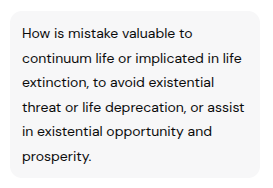TO MISTAKE OR NOT TO MISTAKE, THAT IS THE QUESTION

Mistakes play a crucial role in both the continuity of life and the potential for existential threats or opportunities. Here’s how they impact various aspects of existence:
Value of Mistakes in Continuity of Life
Learning and Adaptation: Mistakes are essential for learning. They provide feedback about what does and doesn’t work, allowing individuals, species, and societies to adapt. For example, organisms that make errors in their behaviors may learn better strategies for survival.
Innovation and Growth: Many breakthroughs in science, technology, and even personal development arise from mistakes. These missteps can lead to unexpected discoveries and innovations, driving progress and prosperity.
Resilience: Facing and correcting mistakes helps develop resilience. Overcoming failures can strengthen an organism or community, making them better equipped to handle future challenges.
Implications for Life Extinction
Risk of Repetition: If learning from mistakes doesn’t occur, there’s a risk of repeating behaviors that lead to existential threats. For example, environmental negligence can lead to biodiversity loss and, ultimately, species extinction.
Inflexibility: Entities that do not embrace mistakes may become rigid, unable to adapt to changes. This inflexibility can contribute to decline, as they fail to respond to new challenges.
Avoiding Existential Threats
Exploratory Behavior: Making mistakes can encourage exploration and experimentation. By trying new things, individuals or organizations may find solutions to existential threats, such as climate change or health crises.
Collaboration and Discussion: Mistakes often lead to conversations and collaborations that foster collective problem-solving. Groups that acknowledge and analyze missteps can develop stronger strategies to face threats.
Assisting in Existential Opportunity and Prosperity
Creative Solutions: Many successful ventures stem from a series of mistakes. Embracing a mindset that views mistakes as opportunities can lead to innovative solutions that propel growth and prosperity.
Diversity of Thought: Mistakes can encourage diverse thinking and perspectives, promoting an environment where unconventional ideas flourish. This diversity is often key to thriving in complex and changing environments.
Conclusion
Understanding the value of mistakes can shift our perspective on failure, viewing it not as an endpoint but as a necessary step toward evolution, resilience, and success. By acknowledging and learning from our missteps, we can better navigate challenges and seize opportunities for growth, ultimately supporting the continuity of life and enriching our existential experience.
